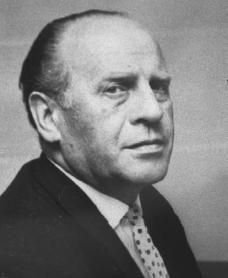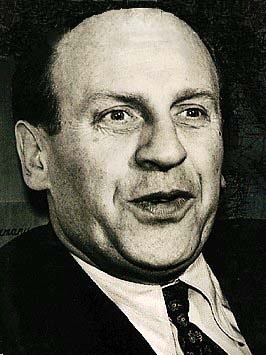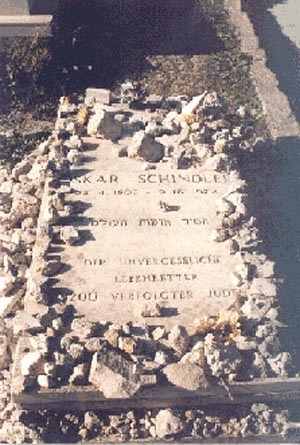 |
| Oskar Schindler (http://www.notablebiographies.com) |
“A hero is a man who does what he can.” (Romain Rolland) Heroes do not casually stroll down star spangled roads, stopping for moments of blissful relaxation whenever they choose. They do not wear King Arthur’s golden crown or carry Gandalf’s magic staff. True heroes travel an unpaved, treacherous road where their feet get caught in crevices and their arms scraped by malicious branches. Heroes may fall and suffer countless injuries, but they stubbornly continue, not even sparing seductive exit signs a glance. These people have unfailing courage even in the most desolate and hopeless of times. Where many would surrender and lay down their weapons, heroes persistently battle on and willingly give everything they have for what they believe in. Oskar Schindler, a charming German businessman who courageously risked and sacrificed to save more than one thousand lives, exemplifies such a hero.
 |
| Oskar Schindler (http://www.scrapbookpages.com/Poland/kazimierz/ Kazimierz01.html) |
Schindler inhaled his first breath on April 28th, 1908 in Austria, Hungary, where he spent his childhood years among both German and Jewish playmates (Rooney). His father was an alcoholic and his mother died young, but that didn’t stop Schindler from becoming one of the most talented and charming businessmen who could profit from the most unlikely situations, especially a war (Online ed. Detroit: UXL). However, when World War 2 started and the persecution of Jews began, Schindler, disturbed by the murder of the innocent, abandoned his selfish desires to gain money and started building factories in Poland to employ Jewish workers, thus saving them from brutal torture and certain death. This clever act attracted attention from the SS and even led to Schindler being arrested twice, but that didn’t stop him from tirelessly working to keep his haven factories open and running (Rooney). Through expensive gifts and bribes Schindler managed to remain on excellent terms with German officials and succeeded in saving doomed Jews at the same time.
Like a lone dove amidst a flock of crows, Oskar Schindler stood out and courageously defied his countrymen for something he believed was right. In 1941 German-occupied Poland was a country bursting with racism and hatred against Jews. The majority of Germans blindly supported Hitler’s mad ideas, treating the Jewish race like inferiors not worthy of their attention. An exception to this was Oskar Schindler; “The persecution of Jews in occupied Poland meant that we could see horror emerging gradually in many ways. In 1939, they were forced to wear Jewish stars, and people were herded and shut up into ghettos. Then, in the years '41 and '42 there was plenty of public evidence of pure sadism. With people behaving like pigs, I felt the Jews were being destroyed. I had to help them. There was no choice.” (Schindler).
In 1942 Oskar Schindler assembled his first famous factory in Poland, which employed Jews of every age, all working together to manufacture supplies for the German army. He accomplished this act right under the sharp and interrogative nose of the SS, somehow managing to get them to believe in the innocence of what he was doing. One false step, one careless word would have unveiled his intentions and brought upon him cruel punishment or even death. He could have been tossed into jail, he could have been shot, he could have been tortured or he could have even been put into a Jewish death camp as an equal to the “lesser people”. None of this stopped him. Schindler mustered up enough bravery to overlook the possible disastrous outcomes of his sacred mission, and continue fighting for what he thought was honorable and correct. His valor became a beacon of light in a dark chamber of endless, unimaginable horrors, a beacon which guided and gave many other people enough strength to peer through the shadow and see a bright future ahead. Schindler’s unfailing courage seeped into seemingly trivial but dangerous acts he succeeded in achieving every day. For instance, when the SS came knocking on his factory doors, demanding the liquidation of Jewish children and old people, Oskar Schindler boldly declared that he had no under or over aged workers (Bruce). He presented the SS with false records, which he himself had created, proving that all his employees were the proper age to work, when in reality many were not legitimate or profitable members of the work force. The fabrication of bogus documents and fake records was a risky act Schindler often undertook in order to ensure the safety of the Jewish workers he had come to respect and love. This risky business required not only skill but an acceptance of the consequences if found out. Schindler boldly and bravely embraced this and took the chance he was given to save at least a few more helpless souls. His courage was the firm foundation to his every act, propelling him to defeat the cruel forces threatening to drag him to a bottomless pit and choke out every desire to fight for his cause.
 |
| Schindler's workers (http://www.wc.pdx.edu/oskarschindler/schind2.jpg) |
Throughout his four-year rebellious campaign to protect as many sufferers as possible, Schindler selflessly and altruistically sacrificed all that he could and all that was important to him for the benefit of others. After several years of successfully operating, Schindler’s factory was closed down in 1942 and all its workers deported to a death camp out of the country. Steaming with rage, Schindler demanded the SS give him back his laborers, arguing that they were essential to the German army’s success. When the SS refused, Schindler’s advantageous talent for persuasion kicked in and he proposed that he build an entirely new labor camp next to Plaszow (Jewish labor camp where his workers were sent) out of his own pocket in which his employees would continue working for him and remain untouched by Nazi guards (Schindler, Oskar (1908-1974). UXL Biographies). Schindler, who had once craved to be the richest man in town, gave up all his profits and his well-established business affairs in order to construct a “luxurious” (compared to other camps) Camp Emalia, in which Jews would be protected rather than exterminated. He spent his fortune designing disguised comforts for the people he thought deserved better than what they received from his fellow countrymen. By doing this he cast aside any possibility to live a comfortable and affluent life, which was surely his dream before the war.
Many years later, Oskar Schindler felt the loss of another significant thing he gave up for the lives he saved; his reputation and image. Once the war ended Schindler was often looked down and spat upon by many Germans who thought he had “betrayed” his country and fellow countrymen by siding with the “impure” race. His reputation was thrashed in a violent storm of old hatred which contributed to his inability to continue his business or to establish another successful one in Europe. Eventually Schindler was forced to leave his home and move to Argentina, where he died in 1974 (Zweig). Every day of the war years this man gave something of himself for what he believed in, whether it be his money, time, sleep, or security. All of these factors contributed to what Schindler strove for and wanted to accomplish. In the grand scenario, Schindler sacrificed no less than any heroic figure in history.
 |
| Schindler's grave (http://www.israeljerusalem.com) |
If you picked up a handful of sand it would have over a thousand grains. A thousand grains. A thousand souls. A thousand people owe their lives to a man who, despite being born into one of the most tragic and horrendous times in history, chose to swerve off the star spangled road and follow the wild, winding path leading to the unknown. Oskar Schindler is not just an inspiration and figure of respect to the Jews he saved or the people who lived though World War 2, but to all men and women who have compassion in their hearts for those who unnecessarily suffer for the crime of being born into a certain race or culture. Schindler’s unfailing courage, which lent him a sturdy helping hand when he tripped over roots and stumps in his path, and his selfless sacrifices for others were his fuel, driving him down that mysterious, unwalked road. The very idea that Schindler, when presented with two options, chose the one of hardships and suffering for others, makes him equivalent to any pagan or Greek god ever worshiped. He knew that he was gradually making his way to his downfall, but that fact was inconsequential in his mind. “I hated the brutality, the sadism, and the insanity of Nazism. I just couldn't stand by and see people destroyed. I did what I could, what I had to do, what my conscience told me I must do. That's all there is to it. Really, nothing more.” (Schindler). People look up to rare individuals like Schindler who have the strength to do the right thing in a demanding and hopeless situation. They rely on these individuals for guidance when they need help. Even in a thousand years, Schindler’s actions will still inspire people to rise above everyday life and think about the greater good. He is truly a hero.
Page created on 8/28/2011 12:00:00 AM
Last edited 2/24/2025 5:53:28 PM
Bruce, Robert B. "Schindler, Oskar. "World Book Student. World Book, 2010.
unknown. "Schindler, Oskar (1908-1974). "Encycl. World Bio. . Detroit: Gale Research, 1998.
unknown. "Schindler, Oskar (1908-1974). "UXL Biographies. Detroit: UXL, 2003.
Zweing, Paul. "A Good Man in a Bad Time. "DISCovering Authors. Detroit: Gale, 2003.
